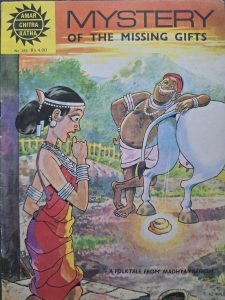
4015 - Mystery of The Missing Gifts
Author: Amar Chitra Katha
Set in a congenial yet close‑knit village gearing up for a festive season, the comic follows three inquisitive children—Ravi, Meena, and Arjun—who discover that gifts meant for village children have been mysteriously disappearing from homes. Determined to solve the mystery, the trio embarks on an adventurous investigation, following clues and encountering various villagers as they unravel unexpected twists. The resolution reveals that the “thief” is not malicious: an elderly villager with memory difficulties had been unintentionally taking the gifts, thinking they were meant for him. Rather than scolding him, the children and community show empathy, include him in the festivities, and restore the missing gifts—with lessons on kindness, understanding, and community unity. Keywords: Mystery, Missing gifts, Children detectives, Festivals, Indian village, Folk tale, Community, Kindness, Problem-solving, Empathy, Moral story, Illustrated comic, Child-friendly mystery, Social values, Teamwork, Adventure, Goodwill, Forgiveness, Inclusive celebration. Ideal For: 1. Moral Education: Teaches empathy, honesty, kindness, teamwork, and understanding — making it great for value-based learning in schools and homes. 2. Festive Season Reading: Set during a festival or celebratory time, it’s an excellent choice for reading around holidays like Diwali or Christmas. 3. Comic Book Lovers: Ideal for children who enjoy illustrated storytelling with strong cultural and emotional appeal. 4. Classroom or Group Activities: Can be used in literature circles or group reading to spark discussions around social behavior, resolving conflict, and caring for elders. 5. Cultural Learning: Helps children connect with Indian village life, customs, and traditions in a light, engaging way. 6. Character-Building Sessions: Useful in libraries, youth clubs, or family settings where character development is a focus. 7. Gift for Young Readers: A thoughtful, educational gift for birthdays, holidays, or as a first mystery book. Young Readers (Ages 6–12): A perfect introduction to mystery and moral storytelling for early readers, with simple language and engaging visuals. Theme: 1. Mystery and Discovery – A light, child-friendly detective story that encourages observation, curiosity, and deduction. 2. Empathy and Understanding – Highlights the importance of not jumping to conclusions and showing compassion, especially toward the elderly and vulnerable. 3. Community and Togetherness – Emphasizes how working together as a community can solve problems and bring people closer. 4. The Spirit of Giving – Reinforces that gifts and celebrations are most meaningful when shared with care and inclusion. 5. Moral Responsibility – Encourages doing the right thing, being fair, and acting kindly even when someone makes a mistake. Tone: Lighthearted: The story is cheerful and gentle, with a playful mood that keeps young readers engaged without fear or tension. Curious & Adventurous: It maintains a sense of mystery and excitement as the children search for clues, encouraging problem-solving. Warm & Uplifting: The narrative conveys kindness and community values, ending on a hopeful and positive note. Instructive (but not preachy): The story teaches important life lessons subtly through characters’ actions and dialogue. Empathetic: The tone fosters compassion, especially toward the elderly or misunderstood, encouraging readers to be thoughtful. Book Type: Children’s Illustrated Comic Book (specifically part of the Amar Chitra Katha series) Genre: Mystery (light, child-friendly) Moral Fiction / Folk Tale Adaptation Educational / Cultural Story Format: Graphic Narrative – Uses comic-style panels with dialogues and illustrations. Short-form – Typically 30–32 pages. Target Audience: Children aged 6–12 Early readers and moral education learners. Length: The Amar Chitra Katha comic The Mystery of the Missing Gifts is consistently reported to be 32 pages long in its editions from 2011 onward . Some listings (such as Google Books) note a slightly shorter count of 30 pages in earlier printings (~1990 editions). . Page Length Summary Edition / Year Approx. Pages Original / Circa 1990 ~30 pages 2011 Reprint Editions 32 pages So, most commonly, the comic is 32 pages—a concise, child-friendly read within the typical Amar Chitra Katha format.
